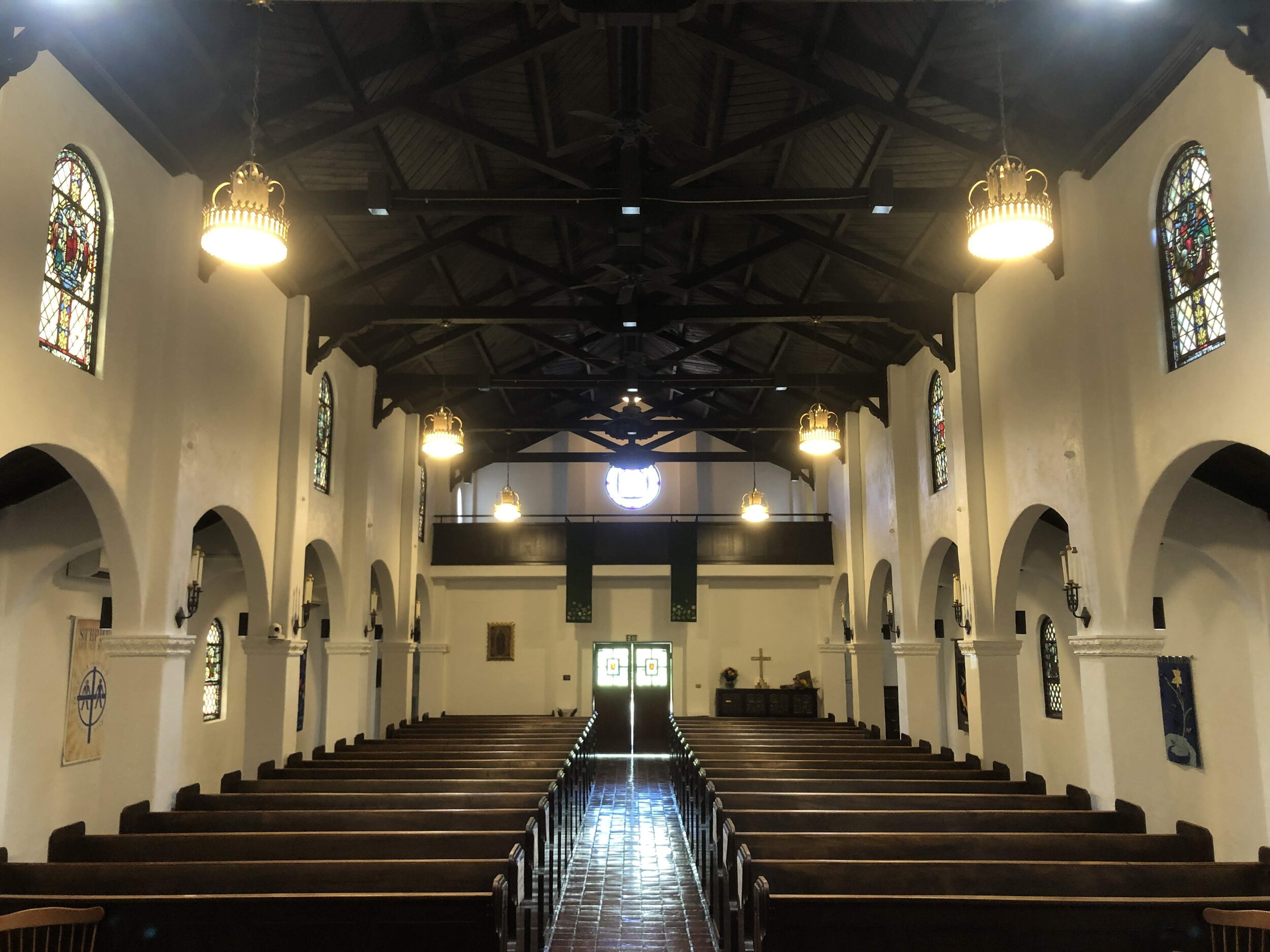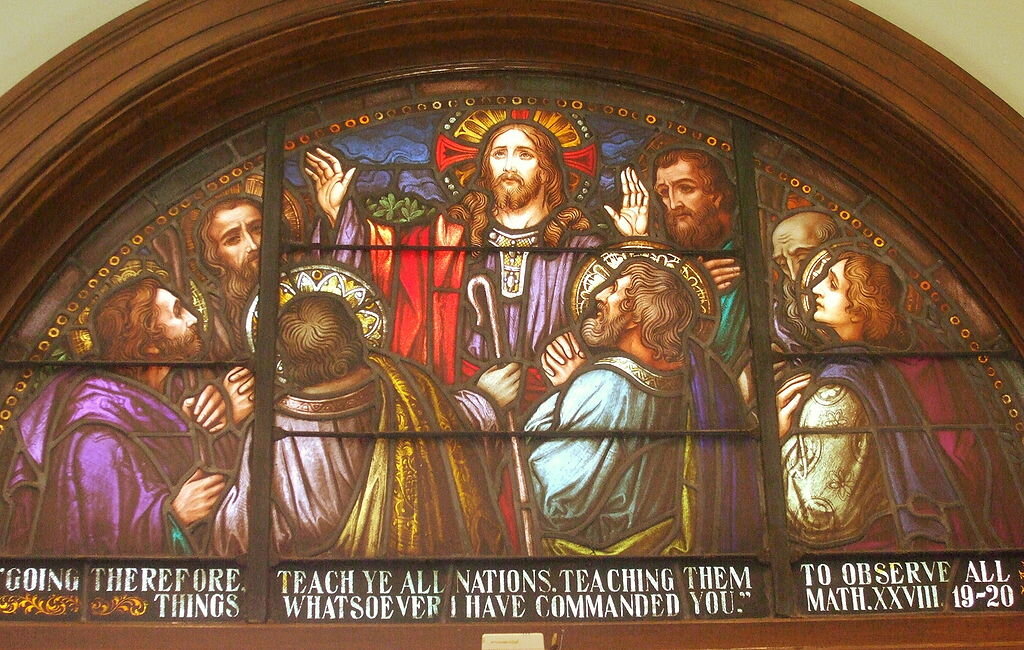by Fr. Bill Garrison
Please note that the following sermon text was provided prior to the audio recording. The two versions may differ substantially.
Jesus called the crowd to him and said to them, “Listen and understand: it is not what goes into the mouth that defiles a person, but it is what comes out of the mouth that defiles.” Then the disciples approached and said to him, “Do you know that the Pharisees took offense when they heard what you said?” He answered, “Every plant that my heavenly Father has not planted will be uprooted. Let them alone; they are blind guides of the blind. And if one blind person guides another, both will fall into a pit.” But Peter said to him, “Explain this parable to us.” Then he said, “Are you also still without understanding? Do you not see that whatever goes into the mouth enters the stomach, and goes out into the sewer? But what comes out of the mouth proceeds from the heart, and this is what defiles. For out of the heart come evil intentions, murder, adultery, fornication, theft, false witness, slander. These are what defile a person, but to eat with unwashed hands does not defile.”
Jesus left that place and went away to the district of Tyre and Sidon. Just then a Canaanite woman from that region came out and started shouting, “Have mercy on me, Lord, Son of David; my daughter is tormented by a demon.” But he did not answer her at all. And his disciples came and urged him, saying, “Send her away, for she keeps shouting after us.” He answered, “I was sent only to the lost sheep of the house of Israel.” But she came and knelt before him, saying, “Lord, help me.” He answered, “It is not fair to take the children’s food and throw it to the dogs.” She said, “Yes, Lord, yet even the dogs eat the crumbs that fall from their masters’ table.” Then Jesus answered her, “Woman, great is your faith! Let it be done for you as you wish.” And her daughter was healed instantly.
—Matthew 15:10-28
Today we have two gospel readings which have been joined together to teach a couple important points. So let’s begin with the first.
The Pharisees have been commenting on the eating habits of Jesus and his disciples. They weren’t consuming the “right foods” and they had been hanging out with the “wrong people” and at this moment they were complaining about the disciples eating without washing their hands. The disciples were bothered by this being good Jews. They knew the cleanliness laws.
Jesus told them not to pay attention to what they had to say, that what they were complaining about hadn’t come from God. The fact is that the food that goes into one’s body serves a purpose, yet winds up in the sewer eventually. So, he said, let’s not define a person by what they eat or how they eat it.
Instead, let’s think about what comes out of a person’s mouth. What comes from the mouth is what can defile a person. The important things begin in the heart and leave the body through the mouth. Jesus gave us a bunch of examples of things that defile us that originate in the heart. We quote him now. “For out of the heart come evil intentions, murder, adultery, fornication, theft, false witness, slander. These are what defile a person, but to eat with unwashed hands does not defile.”
I don’t imagine there is a person listening to me now that would disagree with what Jesus is saying. We know our own selves. We know the evil that we are capable of producing. It’s pretty scary sometimes to think about. It’s even scarier to know what we might be capable of as a result of that thinking.
And yet there is a flip side to this coin. Yes evil comes from within, but so does good. We human beings are as capable of good as we are of evil. For every evil thing that has been created by human beings there are wonderful things that have also been created. Sometimes we really do love our neighbors as ourselves. Sometimes we really do love our God with all our hearts. Sometimes we really do love each other as Christ loved us. The evidence of this is all around us. Every good thing came from the heart of human beings.
I have told the following story from the Cherokee lore many times and I am quite sure I will again. It speaks to the issue we have been discussing.
We find an old Cherokee teaching his grandson about life. “A fight is going on inside me,” he said to the boy. ”It is a terrible fight and it is between two wolves. One is evil – he is anger, envy, sorrow, regret, greed, arrogance, self-pity, guilt, resentment, inferiority, lies, false pride, superiority, and ego.”
He continued, “The other is good – he is joy, peace, love, hope, serenity, humility, kindness, benevolence, empathy, generosity, truth, compassion, and faith. The same fight is going on inside you – and inside every other person, too.”
The grandson thought about it for a minute and then asked his grandfather, “Which wolf will win?”
The old Cherokee simply replied, “The one you feed.”
And I would submit the food we are now talking about is the word and presence of God. I am certain Jesus would agree. With God in our lives as our partner, and with the company of God loving people we are much more likely to have goodness in our hearts as opposed to evil, and the results goodness produces.
And so let’s think about the second part of our gospel reading. A Canaanite woman approaches Jesus begging him to help her daughter. He basically ignores her. She pleads for his help. He bitingly refuses to give it. She pleads with him on her knees. Jesus recognizes that she has tremendous knowledge of who he is and what he is capable of and grants her request. Her daughter is healed.
Years ago I had on the football team I coached a terrific young man. He was a really talented football player. He was everything a coach could hope for and more. He paid attention and stayed out of trouble. His grades were good and he was a good teammate. But there was something else about him that captured my attention.
He and his father were extremely close. His father attended every practice and every game. He and his son had wonderful communication. You could just tell. But there was something more.
You see his father was in a wheel chair. Every practice and every game this young man wheeled his father to practice and on game days to the field where we were we were going to be playing. He did this every time, and he made sure his father was safe and had what he needed before he would leave him and join his teammates. Then at water break or halftime he would check on him again. Afterward he would wheel his father to the car, both of them chatting happily. I must admit I get tears in my eyes when I think about it. There was much goodness in this young man’s heart.
The Canaanite woman begging Jesus to heal her daughter had that same goodness in her heart. She knew the social mores of approaching a man in public. She knew that Jesus was an important person and a great teacher and according to societal rules should not be approached. Yet she loved her daughter so much that she was willing to take a chance and approach Jesus on her daughter’s behalf. What began in her heart was love, what came from her mouth was understanding and hope. Jesus responded.
We think about the gospel lesson today. We are reminded to feed our hearts through our partnership with God. That partnership is the source of goodness that strengthens within us as the partnership develops. It even gives us the courage to speak when others would rather we did not. At the same time we are supplied with the courage not to speak when others would rather we did, joining with them.
In partnership with God we have the potential to become self differentiated people and non anxious presences for those around us. We, like Jesus, can know who we are and whose we are. We can become less tempted to let evil emanate from us, and more capable of distributing the love and goodness that grows within. When it becomes time to speak and act we do. And the winds that blow around us are less likely to carry us away. And through this process in partnership with God we grow into the leaders God has created us to be, and the assets to our communities we can become.






















